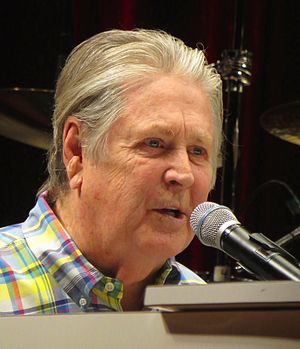Brian Wilson (musician)
| Brian Wilson | |
|---|---|

Brian Wilson performing in the USA
|
|
| Background information | |
| Birth name | Brian Douglas Wilson |
| Born |
June 20, 1942 Inglewood, California, U.S. |
| Origin | Hawthorne, California, U.S. |
| Genres | |
| Occupation(s) |
|
| Instruments |
|
| Years active | 1961–present |
| Labels | |
| Associated acts |
|
| Website | brianwilson |
| Notable instruments | |
Brian Douglas Wilson (born June 20, 1942) is an American musician, singer, songwriter, and record producer best known for being the multi-tasking leader and co-founder of the rock band the Beach Boys. After signing with Capitol Records in 1962, Wilson wrote or co-wrote more than two dozen Top 40 hits for the group. Because of his unorthodox approaches to song composition and arrangement and mastery of recording techniques, he is widely acknowledged as one of the most innovative and influential creative forces in popular music by critics and musicians alike.
In the mid-1960s, Wilson composed, arranged and produced Pet Sounds (1966), considered one of the greatest albums ever made. The intended follow-up to Pet Sounds, Smile, was canceled for various reasons, which included Wilson's deteriorating mental health. As he suffered repeated nervous breakdowns, Wilson's contributions to the Beach Boys diminished, and his erratic behavior led to tensions with the band. Following a court-ordered removal from the care of psychologist Eugene Landy, Wilson started receiving conventional medical treatment, and in the late 1990s, he began performing and recording consistently as a solo artist. He remains a member of the Beach Boys' corporation, Brother Records Incorporated.
Wilson's work with the Beach Boys helped raise pop music to the level of high art. He is considered a major innovator in the field of music production, the principal originator of the California Sound, one of the first music producer auteurs, and one of the most famous examples of the outsider musician. Only 21 years old when he received the freedom to produce his own records with total creative autonomy, he ignited an explosion of like-minded California producers, supplanting New York as the center of popular records, and becoming the first rock producer to use the studio as its own instrument. Wilson effectively set a precedent that allowed bands and artists to enter a recording studio and act as their own producers or co-producers. His songs became inextricably tied with the zeitgeist of the early 1960s, and he helped develop the sound of the wistful Flower Power era that proceeded. In later years, Wilson was regarded as a "godfather" to an era of indie musicians who were inspired by his melodic sensibilities, chamber pop orchestrations, and recording explorations.
...
Wikipedia
